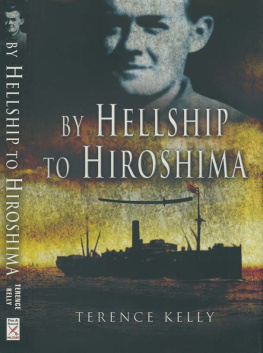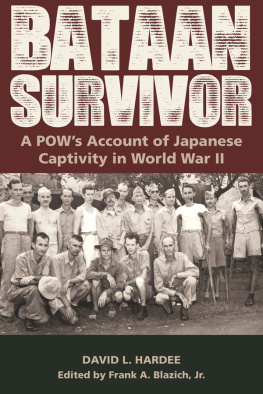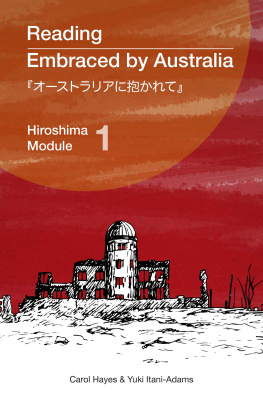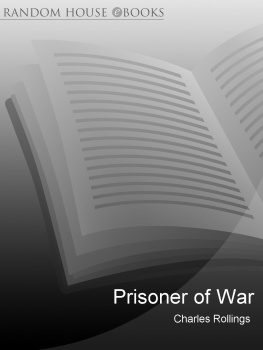BY HELLSHIP
TO HIROSHIMA
Also by Terence Kelly
Novels
Properjohn
The Carib Sands
The Developers
The Genki Boys
The Blades of Cordoba
Play in a Hot Summer
Revolution on St Barbara
Fepow
Voyage Beyond Belief
The Spy is Dead
Long Live the Spy
Non-fiction
Hurricane Over the Jungle
Battle for Palembang
Hurricane in Sumatra
Hurricane and Spitfire Pilots at War
Books in large print
Properjohn
The Carib Sands
The Genki Boys
Voyage Beyond Belief
The Spy is Dead
Long Live the Spy
Hurricane Over the Jungle
Battle for Palembang
Plays
A Share in the Sun (with Campbell Singer)
Divorce in Chancery
Four Sided Triangle
The Genki Boys
Just Before Dawn (from Elleston-Trevors A Little Place for the Wicked)
Honest Tom
Carnival in Trinidad
Stella
The Masterminds
Revolution on St Barbara
Crackdown
BY HELLSHIP
TO HIROSHIMA
Terence Kelly

Pen & Sword
MILITARY
First published in Great Britain as Living With Japanese in 1997 by Kellan Press
Published in this format in 2006 by
Pen & Sword Military
An imprint of
Pen & Sword Books Ltd
47 Church Street
Barnsley
South Yorkshire
S70 2AS
Copyright Terence Kelly 1997, 2006
ISBN 1 84415 403 3
ISBN 978 1 84415 403 6
The right of Terence Kelly to be identified as Author of this work has been asserted
by him in accordance with the Copyright, Designs and Patents Act 1988.
A CIP catalogue record for this book is
available from the British Library
All rights reserved. No part of this book may be reproduced or transmitted in any
form or by any means, electronic or mechanical including photocopying, recording
or by any information storage and retrieval system, without permission from the
Publisher in writing.
Printed and bound in England
By CPI UK
Pen & Sword Books Ltd incorporates the Imprints of Pen & Sword Aviation,
Pen & Sword Maritime, Pen & Sword Military, Wharncliffe Local history,
Pen & Sword Select, Pen & Sword Military Classics and Leo Cooper.
For a complete list of Pen & Sword titles please contact
PEN & SWORD BOOKS LIMITED
47 Church Street, Barnsley, South Yorkshire, S70 2AS, England
E-mail: enquiries@pen-and-sword.co.uk
Website: www.pen-and-sword.co.uk
Contents
List of Illustrations
More than fifty years have passed since the atom bombs dropped on Hiroshima and Nagasaki brought the Far Eastern War to its end and saved the lives of the scores of thousands of Japanese prisoners of war who would quite certainly have been liquidated had the alternative of invading Japan been followed. Through those years many books have been written by survivors with the great majority understandably based on the hardships they endured and the brutality they suffered and any ex-prisoner who writes about his captivity in any other vein is likely to considered disloyal and accused of attempting to vindicate a nation unworthy of such rehabilitation.
Such is not my purpose. As a Japanese prisoner myself, I experienced their callousness at first hand and even after fifty years find it impossible either to forgive them for the quite unnecessary suffering they caused or, as some have done, to accept the simplistic excuse that their behaviour stemmed from an evil system now thankfully put behind them.
But when I look back on my own captivity, I cannot just dismiss those three and a half years as an ugly experience best forgotten for in them I learnt a great deal about myself, a great deal about the behaviour of human nature under stress and I believe rather more about the Japanese than was learnt by the vast majority of my compatriots slaving on railways, working in copper mines or building airfields on remote tropical islands. This came about because after seven months spent in a noisome Javanese gaol followed by a voyage to Japan in conditions of such horror as to beggar description, I found myself in a camp close to Hiroshima which I believe to have been quite unique in the annals of prisoner of war experience.
Not only was this camp far better than most (and quite possibly the best camp in which the Japanese housed any of their prisoners) but about half of its inmates were ex-Colonials from Hong Kong: men who had been bankers, teachers, judges, lawyers, shipowners, taipans - men who knew the Orient and those who lived in it, whose education, background, ambition and clout put them poles apart from the largely young, raw, unfledged servicemen beside whom for the best part of the next three years they were going to have to work as dockyard coolies. It was an extraordinary mixture. A man with an ambition to arrange the social experiment of forcing two groups of men utterly disparate in age, class and experience to live and work together could hardly have chosen a better setting.
And then again, unlike the majority of prisoners who only saw their fellow prisoners and guards, we worked side by side with ordinary Japanese, old men who had never known war, young men who had returned after completing two years of military service, seamen off passing ships who spoke English and had been to America and Britain. We shared with them the early days when Japan was cock-a-hoop with victory and the later days when defeat was imminent and our dockyard, pulverized by bombing, had almost ceased to function. We learnt quite a bit of their language, ate the same food, did the same work, suffered the same injuries and endured the same bombing. And we knew the same privations as towards the end of the war Japan became a country for which, with all the major cities flattened, its shops empty of goods and food in desperately short supply, nothing lay ahead but starvation or shaming defeat. In a word we had the opportunity of getting to know its people in a way that was at the time granted to very few and is certainly not granted to those who do business with them nowadays.
Before the war to most Europeans the Japanese were an obscure Far Eastern race who eked out some sort of living by selling gimcrack copies of largely trivial articles invented by their betters. But now we live in a world in which the Japanese influence on our lives is enormous, inescapeable and on-going. The Japanese decisively affect our economy, swamp us with goods essential to our lives and are everywhere personally in evidence. We cannot disregard them - and we consider them casually at our peril. Yet what kind of people are they? How should we categorize them? How do we relate the quietly-dressed, exceptionally well-behaved and courteous passenger who takes the seat beside us in an aircraft to the brutes of whom ex-prisoners write so damningly? He must surely be of quite a different breed. Or is it that the fifty post-war years of concentration on securing prosperity by commercial rather than militaristic means have utterly changed the ethos of a race of more than one hundred million souls?
Both premises are surely unacceptable. Whereas from time to time the conduct of nations may change, their character is more obdurate. The Common Market has not removed the difference in make-up of say the Germans and the French; deep-seated beliefs and principles handed down from generation to generation are not so easily dismantled. And if this is true of nations living cheek by jowl and pressurized by immediately neighbouring ideologies, how much truer must it be of an island race which for century after century kept itself aloof from outside influences.
Towards the end of the eighth century Japan became an autonomous country with a feudal society, Buddhist in religion, largely cut off from the outside world, and certainly from the Western world, and even the discovery of Japan by the Portugese and Spanish some eight hundred years later, had little impact. From 1638 until 1853 this detachment from outside influences was, if anything, intensified by an edict of the rulers that only a single port, Nagasaki, should remain open to foreign trade with only Chinese and Dutch ships permitted to enter it. A dynasty of governors which had unified the country and established a rigidly enforced regimen had no wish to see it undermined by Western and Christian influences. It took the advent of an American, Commander Perry, to enforce the countrys opening-up.
Next page
















